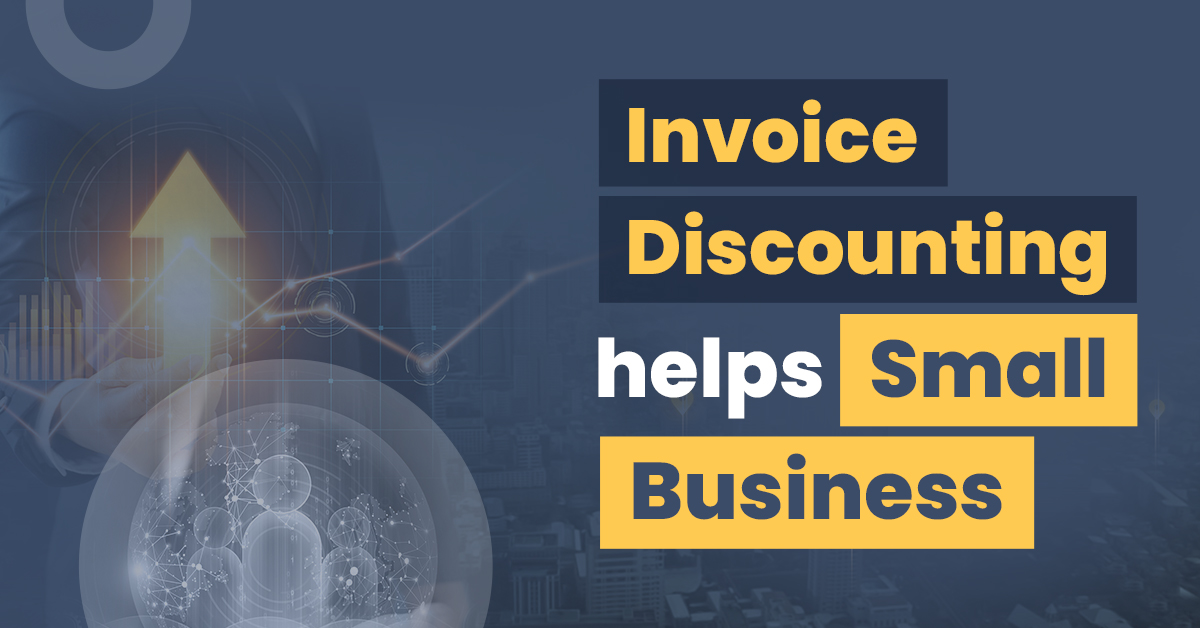How Does Invoice Discounting Help Small Businesses?


Small and medium-scale enterprises (SMEs) are truly the heart of the Indian economy. Like every other business, SMEs also need adequate funds to carry out their routine operations. However, the fear of facing a crash crunch due to delayed payments from clients, is a common concern among small and medium-sized business owners. Late payments prevent businesses from taking up new assignments because of the absence of working capital, which hampers growth.
Moreover, it is not easy to procure a loan from traditional financial institutions. So, these businesses often resort to invoice discounting for their working capital needs. Invoice Discounting is essentially a process of raising funds in exchange for a company’s unpaid invoices. This process of invoice discounting to grow small businesses helps turn your invoices into cash. It is executed by discounting platforms that allow your business to address financial emergencies. Let us elaborate on this.
Understanding invoice discounting
Invoice Discounting, also known as bill discounting, is used by small and medium-scale enterprises to cash out their invoices by selling them to a lender/financing company. However, instead of lending the entire invoice amount, generally the financing company only provides a certain portion (ranging from 60-85%) of the invoice. It serves the purpose of meeting your short-term working capital requirements.
Small businesses rely entirely on receiving invoice payments from their clients to run operations and meet liquidity needs. Interestingly, the concern is not about receiving these payments but more about when they will be received. The standard repayment duration of invoices is between 30 to 45 days; sometimes, it takes up to 90-120 days. If the businesses require funds during this period, they can quickly opt for invoice discounting.
Remember, the cash obtained from invoice discounting is not used in long-term investments to augment a company’s assets. This is a short-term borrowing approach and not a standard capital loan. It works like an emergency credit borrowing system that proves beneficial for small-scale organisations.
Example of invoice discounting
Suppose you are short of funds to run your start-up and have pending invoices from your customers. If the total bill amounts to Rs. 50,000 and you need them in advance, you can sell the bills to an invoice discounting service provider (financing company). Depending on your past debts and credit quality, they can offer you upto 90 percent of the money, which amounts to Rs. 45,000 based on the invoices. Further, the lending company will charge a processing fee for this transaction.
Several lenders provide flexibility to the concept by offering this as an unsecured credit loan to encourage businesses.
How Invoice discounting help MSMEs
Let us see the benefits of invoice discounting for small businesses to grow.
- Invoice discounting improves cash flow
Small industries can enjoy an uninterrupted and easy cash flow without any difficulties through invoice discounting. Availing credit has never been easy for them through the conventional process. With invoice discounting, businesses do not need to go through the elaborate loan application process at traditional financial institutions.
Invoice discounting for small businesses helps faster conversion of receivables to cash, and the process becomes swifter if there is talk of early settlement. In addition, this immediate cash flow allows businesses to manage their expenses and grab the opportunities that come their way.
- Transparency and simplified repayment option
The lending process is carried out transparently. Invoice Discounting is a part of supply chain finance, a set of methodologies which promotes low cost and efficiency in transactions for the buyer and the seller. Through this system, the lender finances a large part of the bill at a flexible repayment schedule. This schedule ranges from 15 days to 6 months, depending on the size of the business, to make it easier for small and medium-scale companies to repay the amount.
Sometimes, the flexibility is given to the businesses to such an extent that they can even make the repayment in lump sum to get rid of the extra interest rate. The repayment cycles are designed keeping in mind the borrower’s convenience.
- Invoice Discounting reduces the risks associated with bad debts
Bad debts are those where the chance of repayment is less, and probably, they will never be repaid. Unfortunately, it is a reality that businesses often deal with. Invoice discounting, to a large extent, can help to avoid such situations by doing proper credit checks on the debtors. In addition, they employ professionals to deal with such defaulters.
Bad debts are unfortunate risks, and they can crush a business which is otherwise doing well. So, invoice discounting is a life saver for small businesses.
- No collateral is required
The invoices are the only form of guarantee in this type of arrangement. This can be called a collateral fee arrangement to receive credit. This unsecured credit system makes the process more attractive to small and medium-scale companies with low turnover. In addition, the process of garnering money through invoice discounting is easier than other credit lending services.
- Paying employees on time helps retain a skilled workforce
Small-scale businesses often struggle to pay their employees on time. This is one of the most significant responsibilities of the company because in case of failure of salary payment, many good employees often leave the organisation. This is an expense featured every month. With invoice discounting, a business owner can pay his employees on time and offer bonuses as well. Opting for invoice discounting for business ultimately helps him to retain valuable employees who significantly contribute to the growth of the business. This process also helps in skilled recruitment.
- Meeting seasonal demand for products and services
Small businesses do not enjoy a consistent profit. During some months, they experience high sales, while there might be a period with no significant business activity. The demand varies according to the season, but the collection tenure of invoices stays the same. Therefore, even when the peak season comes, businesses cannot fulfil the demands because of the scarcity of funds. Invoice discounting ensures a constant cash flow which helps companies to meet the seasonal work demands.
- Great customising features serve the purpose of taking the loan
The benefit of invoice discounting to grow a small business is that it helps sellers decide the amount of cash they want. Sometimes they partially finance the invoices, and sometimes fully finance them. Furthermore, they also control the repayment duration of these invoices. For example, if they want the cash for the short term, they usually pay it back within 30 days. In addition, some lenders give the facility of a revolving line of credit period from 12 to 18 months so businesses can repeatedly borrow money within the period.
- Offering longer payment time helps win the hearts of the customers
This is a deciding factor in business. When you provide flexible payment time to your clients, you win their hearts and form a business relationship. Such customers will likely stick to you in the future rather than go to your competitors. Invoice discounting enables you to win new customers while retaining the existing ones.
- Investing in advanced technologies will prosper growth
Small-scale businesses need a complete overhauling of their infrastructure, including their IT system, to survive in this fast-paced business environment. These things involve considerable costs; most often, small companies cannot set aside funds for this. As a result, stagnation follows. The easiest way to cover these expenses is invoice discounting. Thus, invoice discounting for business is crucial from the point of view of the prospect of growth.
Final thoughts
Small-scale and medium industries have been facing a myriad of issues over the years, and lack of credit is just one of them. They are often deprived of formal credit that is easily given to businesses with higher incomes. The government also tries to help them in many ways through funding and promotion from time to time. Invoice discounting is one such strategy that offers a helping hand to these businesses.
This concept of invoice discounting for small businesses is gaining popularity day by day in the present scenario, where the economy is reviving after the COVID effect. So, invoice discounting is an easy way to access funds in hard times. In short, invoice discounting helps small-time organisations to grow at low risk as this is unsecured credit.
FAQs related to invoice discounting for SMEs
Do small businesses also face the problem of bad debts as large-scale firms?
Businesses of all nature face bad debts time and again while conducting commerce. This is because customers and clients often delay payments which can lead to operational disruptions.
How does invoice discounting help small businesses retain their reputation in the market?
Under invoice discounting, the borrowing agreement remains confidential. This way, small-scale businesses are able to shield themselves from public opinion and can maintain a good market reputation.
Does invoice discounting have risk-mitigating techniques to deal with payment issues?
No, invoice discounting does not have any criteria for mitigating bad debts and late payments. If a client refuses to pay their dues even after the credit period, the company would be liable to generate funds to pay off the loan borrowed from the financing company.
Do financiers offer additional discounts to small businesses in terms of invoice discounting?
It depends on the financing company if they provide additional interest rate discounts to small firms or not. However, most financiers do not have special provisions for small businesses.
Is invoice discounting better than bank loans for small businesses?
Contrary to bank loans, invoice discounting has less documentation and easier eligibility criteria. This ensures that businesses have easier access to funds.
Is an unsecured loan such as invoice discounting safe for a small business?
Despite being an unsecured loan with a lack of collateral, invoice discounting borrowings are on the safer side. This is due to their risk-free nature. There is very little possibility of a company being in debt with a financing company after receiving payments from clients.




